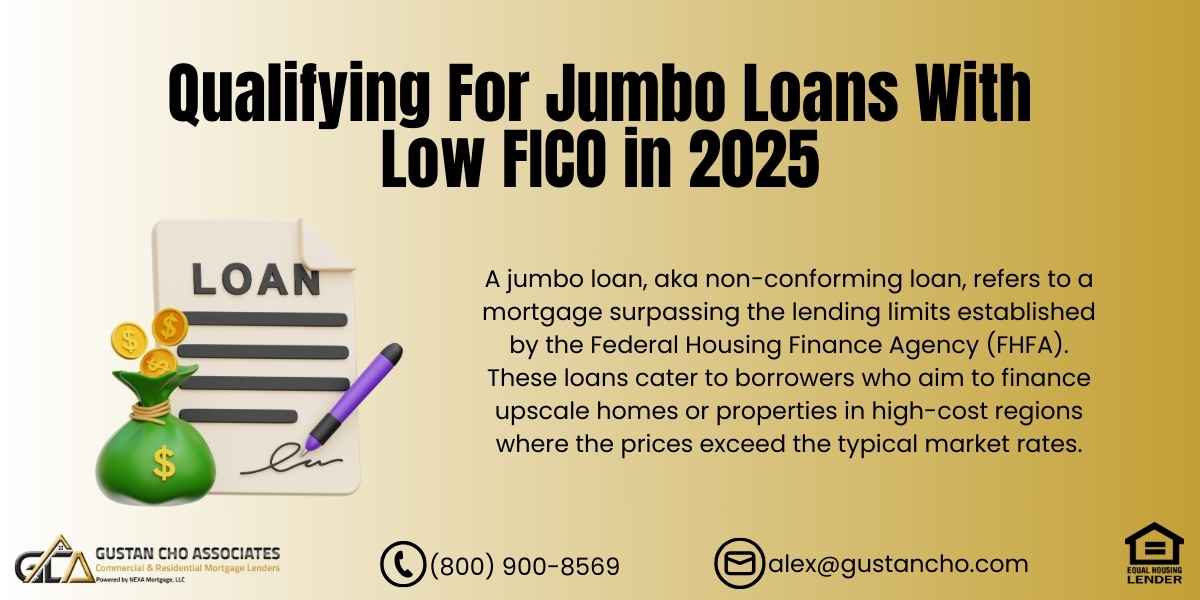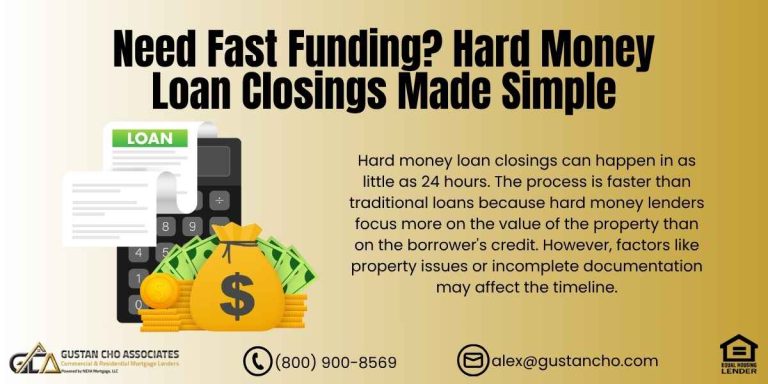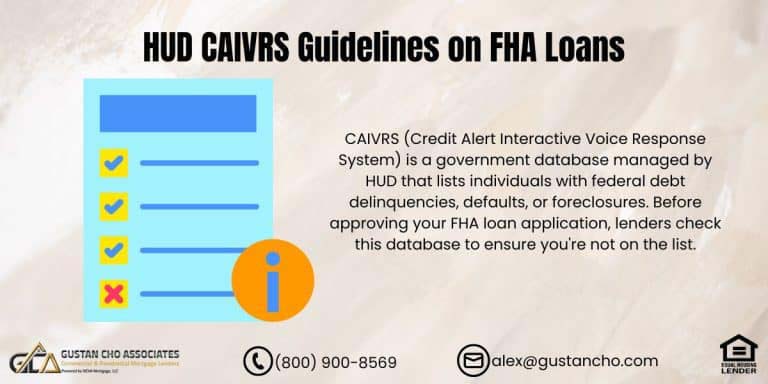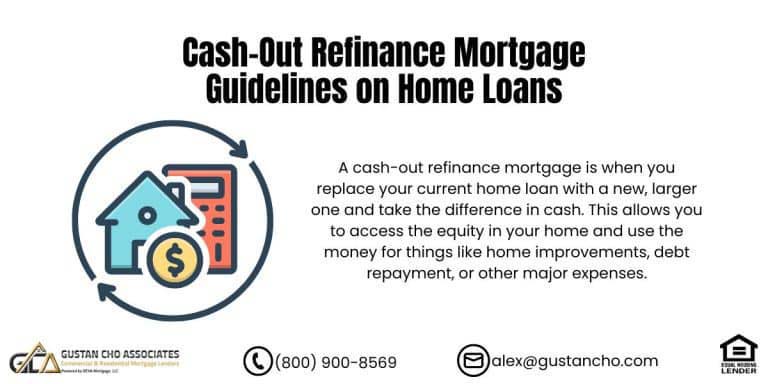Qualifying for Jumbo Loans in 2025: Your Complete Guide
If you dream of purchasing a high-value home and need a loan larger than traditional mortgage limits allow, you’re in the right place. Jumbo loans offer the perfect solution for financing homes that exceed conforming loan limits.
In this guide, we’ll explain everything you need to know about qualifying for jumbo loans in 2025, including updated guidelines, flexible options, and how Gustan Cho Associates can help you secure the loan you need.
What Are Jumbo Loans?
A jumbo loan, a non-conforming loan, refers to a mortgage surpassing the lending limits established by the Federal Housing Finance Agency (FHFA). These loans cater to borrowers who aim to finance upscale homes or properties in high-cost regions where the prices exceed the typical market rates. This can help you access financing options matching your aspirations in luxury real estate, ensuring you secure the home of your dreams.
Jumbo mortgages are portfolio loans. Portfolio loans do not have to conform to Fannie Mae and/or Freddie Mac agency guidelines.
In 2025, the nationwide baseline conforming loan limit for a single-unit residence in standard areas stands at $766,550, while it may be elevated in specific high-cost regions. Any loan that is higher than this limit is a jumbo loan. Understanding these differences can help you make better choices when buying a home.
Qualify for Jumbo Loans With Lower Credit Scores
Apply Online And Get recommendations From Loan Experts
Why Choose a Jumbo Loans
Jumbo loans are ideal for borrowers who:
- Want to purchase a high-value home exceeding conforming loan limits.
- Need financing for luxury properties or homes in high-cost areas.
- Prefer loans that don’t require mortgage insurance with a large down payment.
- Are self-employed or have non-traditional income sources.
At Gustan Cho Associates, we specialize in helping borrowers qualify for jumbo loans with flexible credit requirements and competitive rates.
Qualifying for Jumbo Loans: Key Requirements
Qualifying for jumbo loans can be more challenging than securing a conventional loan. However, with the right guidance and preparation, it’s entirely possible. Here are the main criteria:
1. Credit Score
- Traditional jumbo loans: Most lenders require a credit score of 700 or higher.
- Flexible programs at Gustan Cho Associates: Gustan Cho Associates offers flexible loan programs, allowing borrowers to qualify for specific jumbo loan options with credit scores starting at just 660. This accessibility makes it easier for individuals to explore homeownership opportunities, even if their credit history has some challenges.
2. Debt-to-Income (DTI) Ratio
- Standard requirement: Lenders typically prefer a DTI of 43% or lower.
- At Gustan Cho Associates: We offer jumbo loan options for borrowers with DTIs up to 50%, provided there are strong compensating factors such as substantial reserves or a higher down payment.
3. Down Payment
- Conventional lenders: Many traditional lenders typically require a down payment of 20% to 25%. Understanding these expectations can help you better prepare for the home-buying process.
- Our programs: We offer 10% down jumbo loans for qualified borrowers, even on loans up to $3.5 million.
4. Reserves (Post-Closing Liquidity)
- Lenders often require 6 to 12 months of reserves, which are funds available after closing to cover your mortgage payments.
- Reserves can include liquid assets, savings, or retirement funds meeting eligibility criteria.
5. Income Documentation
Full documentation is standard, but non-QM options allow more flexibility. For example, bank statement loans use your deposits to determine income, making them ideal for self-employed borrowers.
Jumbo Loan Options in 2025
Traditional Jumbo Loans
These loans are for borrowers with steady income, good credit, and the ability to meet standard documentation requirements. Highlights include:
- Competitive interest rates.
- Financing options are available for loan amounts reaching $3.5 million or greater.
- Fixed or adjustable-rate options.
Non-QM Jumbo Loans
Non-QM (non-qualified mortgage) jumbo loans are designed for borrowers who don’t fit traditional lending guidelines. They’re ideal for:
- Self-employed individuals.
- Borrowers who have experienced recent credit challenges, such as bankruptcy or foreclosure, may still be able to find opportunities.
- Those with fluctuating income.
Key features:
- Credit scores as low as 600.
- Flexible income documentation (e.g., bank statements, profit and loss statements).
- No private mortgage insurance (PMI).
Bank Statement Jumbo Loans
For self-employed borrowers, bank statement loans are a game-changer. Instead of tax returns, lenders use your bank deposits to calculate income.
Requirements:
- 12 to 24 months of bank statements.
- 10% to 20% down payment, depending on credit score.
- Loan amounts up to $5 million or more.
90% LTV Jumbo Mortgage With 660 Credit Score And 50% DTI
One of the most popular jumbo loan programs at Gustan Cho Associates is the 90% LTV Jumbo Mortgage with a 660 credit score and 50% debt to income ratio. This is a traditional full doc jumbo mortgage loan program and not too many lenders offer this unique jumbo loan program.
Get Down Payment Requirement on Jumbo Mortgages
Apply Online And Get recommendations From Loan Experts
Updated Guidelines for 2025
The mortgage industry evolves every year, and 2025 brings several updates to jumbo loan guidelines:
- Higher Conforming Loan Limits: With the new limit of $750,000 nationwide, jumbo loans now apply to even more borrowers in high-cost markets.
- Flexible Credit Scoring Models: New credit scoring models, like FICO 10T and VantageScore 4.0, incorporate trended data, providing a more comprehensive view of borrowers’ creditworthiness. This can help more borrowers qualify for jumbo loans, even with prior credit challenges.
- Digital Mortgage Processes: Many lenders, including Gustan Cho Associates, now offer AI-driven underwriting and digital application tools, which speed up and improve the approval process.
Benefits of Working with Gustan Cho Associates
At Gustan Cho Associates, we understand that every borrower’s situation is unique. Here’s why we stand out:
- Low Credit Score Options: You can qualify with credit scores as low as 660 for traditional jumbo loans or 600 for non-QM options.
- High DTI Allowance: Get approved with DTIs up to 50%.
- Minimal Down Payment: Secure financing with as little as 10% down.
- Custom Solutions: From bank statement loans to cross-collateralized mortgages, we tailor solutions to fit your needs.
- No Overlays: We have no additional restrictions beyond standard guidelines, giving you more flexibility.
Qualifying for Jumbo Loans in 2025
To increase your chances of getting approved, follow these steps:
- Check Your Credit Report: Examining your credit report for any inaccuracies is essential. If you find errors, take proactive steps to enhance your score. This can significantly impact your mortgage application and approval process.
- Save for a Down Payment: To optimize your down payment savings, target a range of 10% to 20% of the home’s purchase price. This proactive approach can significantly enhance your financial position when applying for a mortgage.
- Organize Your Finances: Gather documentation such as bank statements, tax returns, and proof of reserves.
- Lower Your DTI: Pay down existing debt to reduce your debt-to-income ratio.
- Work with an Expert: Partner with a lender like Gustan Cho Associates, who specializes in jumbo loans and can guide you through the process.
Final Thoughts
Qualifying for jumbo loans doesn’t have to be overwhelming. With updated guidelines and flexible options available in 2025, more borrowers than ever can achieve their dreams of owning a luxury home. At Gustan Cho Associates, we’re here to make the process as smooth and straightforward as possible.
Ready to get started? Contact us today to learn more about our jumbo loan programs and take the first step toward your dream home.
Start Your Process Towards Buying A Home
Apply Online And Get recommendations From Loan Experts
Frequently Asked Questions About Qualifying for Jumbo Loans
Q: What is the Lowest Credit Score Needed for a Jumbo Loan in 2025?
A: Although many lenders typically look for a credit score of 700 or above, Gustan Cho Associates provides flexible options for borrowers. They can assist those with credit scores starting at 660 for traditional jumbo loans and even as low as 600 for non-QM loans. This means you can secure financing, even if your credit score isn’t where you’d like it to be.
Q: How Much Can I Borrow with a Jumbo Loan?
A: Loan amounts typically range from $750,000 to $3.5 million, but we also offer programs with no maximum loan limits for qualified borrowers.
Q: Can I Get a Jumbo Loan if I’m Self-Employed?
A: Yes! Our bank statement jumbo loans are perfect for self-employed borrowers. We calculate your income based on 12 to 24 months of bank deposits, so you don’t need to provide tax returns.
Q: Do Jumbo Loans Require Mortgage Insurance?
A: No. Unlike conventional loans, jumbo loans do not require private mortgage insurance (PMI), even with a lower down payment.
Q: What is the Down Payment Requirement for Jumbo Loans?
A: Down payment requirements can differ depending on the program you choose. At Gustan Cho Associates, qualifying with only a 10% down payment is achievable. However, this may differ depending on your credit score and the loan size. This flexibility allows more individuals to explore homeownership options.
Q: Are There Jumbo Loan Options for Borrowers with a High Debt-to-Income Ratio?
A: Yes! Gustan Cho Associates offers jumbo loan programs that allow DTIs up to 50%, provided compensating factors such as substantial reserves or a higher down payment exist.
Q: Can Jumbo Loans be Used to Purchase Investment Properties?
A: Yes, jumbo loans can be used for investment properties, but requirements may vary. Speak with a lender to explore options tailored to your financial goals.
Q: What is the Difference Between Traditional and Non-QM Jumbo Loans?
A: Traditional jumbo loans require full documentation and typically higher credit scores. In contrast, non-QM jumbo loans offer more flexibility, including alternative income verification methods like bank statements.
Q: How Does the Interest Rate on a Jumbo Loan Compare to Conforming Loans?
A: Jumbo loan interest rates usually run higher than conforming rates, mainly due to the larger loan amounts and the associated perceived risks. However, you can find competitive rates, particularly through supportive lenders such as Gustan Cho Associates, who are experienced in navigating these unique situations.
Q: What Compensating Factors Can Help Me Qualify for a Jumbo Loan?
A: Compensating factors include a high down payment, significant cash reserves, a strong credit history, or a low DTI. These factors can improve your chances of approval and even secure better terms.
This blog about “Qualifying For Jumbo Loans With Low FICO in 2025” was updated on January 20th, 2025.









